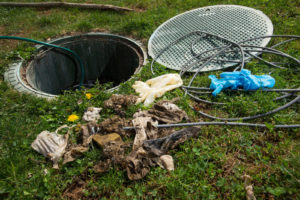
October is turning into November. By the time you read this article, Halloween will only be a few days away. Autumn rains don’t have quite the same reputation for being as vicious as summer thunderstorms, but they can still do a number on your home. What are some of the more significant effects that rain can have on your septic system? Downpours might overwhelm your sump pump, after all!
Before the Rain Starts
Always keep an eye on the weather forecast. Even when the day seems cool, crisp, and clear, rain could pop up without much warning. Even if you don’t pay much attention to your TV or radio for weather news, there are always online reports and results from what your Alexa or Google Home might say. One way to protect your septic tank is by ensuring that the septic system is in prime condition. The system can keep your yard from flooding and prevent sediment buildup from becoming a major problem.
Excess runoff water poses another threat to your septic system. As such, channel it away from your drainfield. Clear debris out of your gutters and adjust them so that they face away from the drainfield as well.
We also advise you not to drive on top of the drainfield. Doing so is a bad idea because your vehicle (or even a riding lawnmower) causes the soil to compact. Soil compaction doesn’t sound too bad, at least not until you realize that the soil is weakened and isn’t as absorbent as it would be otherwise.
While It’s Actively Raining
We understand how unpleasant it is to stand out in the rain when it’s heavy. Nice weather for the ducks, right? Even so, remain on your guard. If you don’t, your septic system might suffer. Pooling water, slow drains, and noisy drains indicate stress. The stress has to do with a clog that needs to be unblocked.
Avoid using too much water when it’s raining sideways outside. That means you should wait before putting on a load of laundry or starting the dishwasher. Walk around your home and inspect it for leaks. Patching up the leaks will prevent more water from pouring into your septic system.
Once the Rain Stops
Give your yard some time to recover after the rain ends. Look at your drainfield – if there’s still water trapped there, it’s time to call a plumber. The plumber can determine what the source of the blockage is. After that, you will want to inspect your septic tank more closely. Are there any silt buildups there?
All of Your Plumbing Needs from Master Plumbing
Give Master Plumbing a call at (301) 650-9100, or contact us online to get more information on how our expert plumbers can help you with just about anything plumbing-related! We have received Angie’s List Super Service Award recognition for plumbing and drain cleaning every year since 2007, in addition to the Best Plumber award from Best of Bethesda. We are fully licensed, bonded, and insured, and our service is unparalleled. Give us a call today—you won’t regret it! To see examples of our projects, follow us on Facebook and Twitter!
